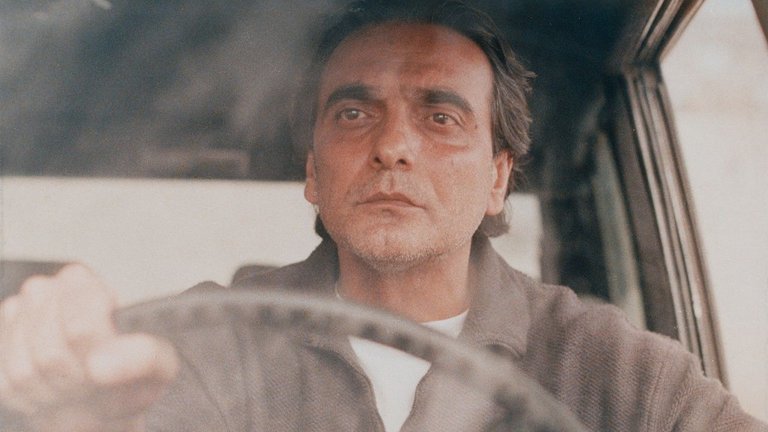The first Iranian film to win the Palme d’Or at the Cannes Film Festival in 1997.
A calm middle-aged man Mr. Badii, driving a Range Rover through the hilly outskirts of Tehran asking various men on the sidewalk for help but his intention is not clear. One of the men even threatens to smash his face in when he offered to solve his money problem, assuming sexual proposition (maybe). Afterwards it becomes clear that Mr. Badii is looking for an accomplice who could help burying him after he commits suicide by taking a lethal dose of pills later that night. He'll be waiting for death lying in a grave after taking the pills. The grave has already been dug, but at dawn someone is needed to check secretly if he's dead or still alive accidently and to cover the grave with soil if he's dead. Mr. Badii doesn't want his dead body to be discovered. Meanwhile a handsome amount of money will be waiting in the car for the man who agrees to to do so.
As the film continues it gets harder to find that someone who agrees to help. Those Mr. Badii approaches refuse to help as they are not comfortable with the kind of help, he is seeking because of their moral values, religious values, hesitations, optimism etc. Besides Mr. Badii is not willing to leave out the reason of why he has come to this point where one decides to free himself from this life.
After failing to interest several men Mr. Badii finds an old man, a taxidermist, who's trying to talk him out of it with his experience and wisdom. The old man even tells Mr. Badii that he himself was suicidal in his youth. One night he climbed upon a tree to tie a rope and hang himself but couldn't do it as soon as he tested mulberry from that tree! But finally, the heavy-hearted old man agrees to help as he realizes Mr. Badii is indeed in pain and too stubborn to change his decision.
Through the conversations between Mr. Badii and the strangers the film confronts us with some questions which tells us to figure out if life is worth living! And at the end of the film we are left alone with ourselves to wonder about the final scene! That was the magic of the most influential Iranian filmmaker Abbas Kiarostami. He played with our thoughts. He once said in an interview, "I did think this was a really big risk, but it was a risk worth taking. Even when I hear people arguing about the ending of the film, I like it because it means the movie hasn’t ended. . . that the film has a life in their minds."
Kiarostami created poetic portrayals of life in almost all of his films! He was one of the greatest masters of cinema who had a unique style of telling stories by blending fiction and reality with simplicity. He was renowned worldwide for his brilliant works. One of his greatest admirers was Akira Kurosawa. “I believe the films of Iranian filmmaker Abbas Kiarostami are extraordinary,” Kurosawa once said. "Words cannot describe my feelings about them, and I simply advise you to see his films. . . When Satyajit Ray passed away, I was very depressed. But after seeing Kiarostami’s films, I thanked God for giving us just the right person to take his place."







